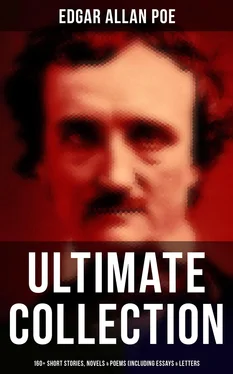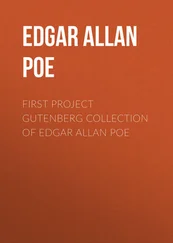We were strolling one night down a long dirty street, in the vicinity of the Palais Royal. Being both, apparently, occupied with thought, neither of us had spoken a syllable for fifteen minutes at least. All at once Dupin broke forth with these words:—
“He is a very little fellow, that’s true, and would do better for the Theatre des Varietes.”
“There can be no doubt of that,” I replied unwittingly, and not at first observing (so much had I been absorbed in reflection) the extraordinary manner in which the speaker had chimed in with my meditations. In an instant afterward I recollected myself, and my astonishment was profound.
“Dupin,” said I, gravely, “this is beyond my comprehension. I do not hesitate to say that I am amazed, and can scarcely credit my senses. How was it possible you should know I was thinking of —?” Here I paused, to ascertain beyond a doubt whether he really knew of whom I thought.
—“of Chantilly,” said he, “why do you pause? You were remarking to yourself that his diminutive figure unfitted him for tragedy.”
This was precisely what had formed the subject of my reflections. Chantilly was a quondam cobbler of the Rue St. Denis, who, becoming stage-mad, had attempted the role of Xerxes, in Crebillon’s tragedy so called, and been notoriously Pasquinaded for his pains.
“Tell me, for Heaven’s sake,” I exclaimed, “the method — if method there is — by which you have been enabled to fathom my soul in this matter.” In fact I was even more startled than I would have been willing to express.
“It was the fruiterer,” replied my friend, “who brought you to the conclusion that the mender of soles was not of sufficient height for Xerxes et id genus omne.”
“The fruiterer! — you astonish me — I know no fruiterer whomsoever.”
“The man who ran up against you as we entered the street — it may have been fifteen minutes ago.”
I now remembered that, in fact, a fruiterer, carrying upon his head a large basket of apples, had nearly thrown me down, by accident, as we passed from the Rue C— into the thoroughfare where we stood; but what this had to do with Chantilly I could not possibly understand.
There was not a particle of charlatanerie about Dupin. “I will explain,” he said, “and that you may comprehend all clearly, we will explain,” he said, “and that you may comprehend all clearly, we will first retrace the course of your meditations, from the moment in which I spoke to you until that of the rencontre with the fruiterer in question. The larger links of the chain run thus — Chantilly, Orion, Dr. Nichols, Epicurus, Stereotomy, the street stones, the fruiterer.”
There are few persons who have not, at some period of their lives, amused themselves in retracing the steps by which particular conclusions of their own minds have been attained. The occupation is often full of interest; and he who attempts it for the first time is astonished by the apparently illimitable distance and incoherence between the starting-point and the goal. What, then, must have been my amazement when I heard the Frenchman speak what he had just spoken, and when I could not help acknowledging that he had spoken the truth. He continued:
“We had been talking of horses, if I remember aright, just before leaving the Rue C—. This was the last subject we discussed. As we crossed into this street, a fruiterer, with a large basket upon his head, brushing quickly past us, thrust you upon a pile of paving-stones collected at a spot where the causeway is undergoing repair. You stepped upon one of the loose fragments) slipped, slightly strained your ankle, appeared vexed or sulky, muttered a few words, turned to look at the pile, and then proceeded in silence. I was not particularly attentive to what you did; but observation has become with me, of late, a species of necessity.
“You kept your eyes upon the ground — glancing, with a petulant expression, at the holes and ruts in the pavement, (so that I saw you were still thinking of the stones,) until we reached the little alley called Lamartine, which has been paved, by way of experiment, with the overlapping and riveted blocks. Here your countenance brightened up, and, perceiving your lips move, I could not doubt that you murmured the word ‘stereotomy,’ a term very affectedly applied to this species of pavement. I knew that you could not say to yourself ‘stereotomy’ without being brought to think of atomies, and thus of the theories of Epicurus; and since, when we discussed this subject not very long ago, I mentioned to you how singularly, yet with how little notice, the vague guesses of that noble Greek had met with confirmation in the late nebular cosmogony, I felt that you could not avoid casting your eyes upward to the great nebula in Orion, and I certainly expected that you would do so. You did look up; and I was now assured that I had correctly followed your steps. But in that bitter tirade upon Chantilly, which appeared in yesterday’s ‘Musee,’ the satirist, making some disgraceful allusions to the cobbler’s change of name upon assuming the buskin, quoted a Latin line about which we have often conversed. I mean the line
Perdidit antiquum litera prima sonum.
I had told you that this was in reference to Orion, formerly written Urion; and, from certain pungencies connected with this explanation, I was aware that you could not have forgotten it. It was clear, therefore, that you would not fall to combine the ideas of Orion and Chantilly. That you did combine them I say by the character of the smile which passed over your lips. You thought of the poor cobbler’s immolation. So far, you had been stooping in your gait; but now I saw you draw yourself up to your full height. I was then sure that you reflected upon the diminutive figure of Chantilly. At this point I interrupted your meditations to remark that as, in fact, he was a very little fellow — that Chantilly — he would do better at the Theatre des Varietes.”
Not long after this, we were looking over an evening edition of the “Gazette des Tribunaux,” when the following paragraphs arrested our attention. “Extraordinary Murders. — This morning, about three o’clock, the inhabitants of the Quartier St. Roch were aroused from sleep by a succession of terrific shrieks, issuing, apparently, from the fourth story of a house in the Rue Morgue, known to be in the sole occupancy of one Madame L’Espanaye, and her daughter, Mademoiselle Camille L’Espanaye. After some delay, occasioned by a fruitless attempt to procure admission in the usual manner, the gateway was broken in with a crowbar, and eight or ten of the neighbors entered, accompanied by two gendarmes. By this time the cries had ceased; but, as the party rushed up the first flight of stairs, two or more rough voices, in angry contention, were distinguished, and seemed to proceed from the upper part of the house. As the second landing was reached, these sounds, also, had ceased, and everything remained perfectly quiet. The party spread themselves, and hurried from room to room. Upon arriving at a large back chamber in the fourth story, (the door of which, being found locked, with the key inside, was forced open,) a spectacle presented itself which struck every one present not less with horror than with astonishment.
“The apartment was in the wildest disorder — the furniture broken and thrown about in all directions. There was only one bedstead; and from this the bed had been removed, and thrown into the middle of the floor. On a chair lay a razor, besmeared with blood. On the hearth were two or three long and thick tresses of grey human hair, also dabbled in blood, and seeming to have been pulled out by the roots. Upon the floor were found four Napoleons, an ear-ring of topaz, three large silver spoons, three smaller of metal d’Alger, and two bags, containing nearly four thousand francs in gold. The drawers of a bureau, which stood in one corner, were open, and had been, apparently, rifled, although many articles still remained in them. A small iron safe was discovered under the bed (not under the bedstead). It was open, with the key still in the door. It had no contents beyond a few old letters, and other papers of little consequence.
Читать дальше












